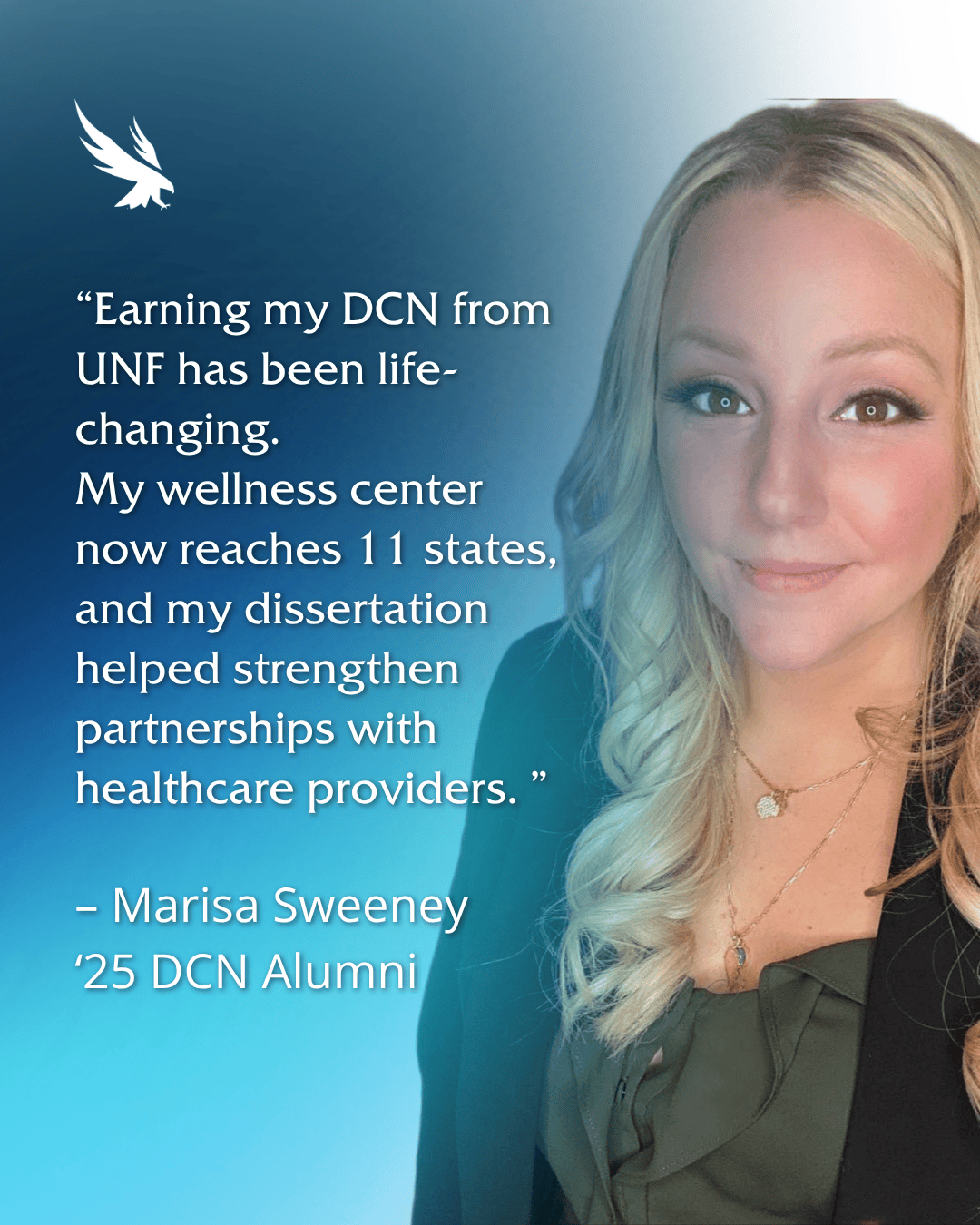Doctor of Clinical Nutrition (DCN) – Fully Online
Advance Your Career with an Online Doctorate in Clinical Nutrition (DCN)
The Department of Nutrition & Dietetics offers an online Doctorate in Clinical Nutrition (DCN). This advanced practice doctoral degree emphasizes leadership, advanced clinical practice, and research, culminating in a Doctor of Clinical Nutrition (DCN) credential. In contrast to a Ph.D. in Nutrition, which is generally focused on bench research, this practice doctorate emphasizes the production of applied scholarship and evidence-based outcomes in real-world settings.
Because this is a practice-based doctorate, applicants must be registered dietitians with a minimum of three years of professional experience. The DCN program prepares practitioners for leadership roles in clinical, community, or higher education settings through coursework, an advanced practice residency, and the development of applied scholarship.

Upcoming Events
Develop Expertise in Advanced Evidence-Based Practice, Leadership, and Research
Graduates will gain expertise and skills in chronic disease prevention, clinical treatment, cultural competency, critical thinking, public policy, and outcomes research to become advanced-level nutrition and dietetics practitioners and researchers. The curriculum will integrate evidence-based practice in nutrition and dietetics to provide the foundation for the completion of an outcome-based research project. The significance of developing an advanced practice Doctorate in Clinical Nutrition is evident from the increasing prevalence of dietary-related chronic diseases (such as heart disease, diabetes, hypertension, obesity, certain cancers, and renal disease). Graduates of the program will be rigorously trained to provide leadership in dietary prevention, intervention, and treatment of chronic disease at the individual and population levels.
Flexible Study Options with Advanced Practice Residency Opportunities
The DCN program is fully online and may be completed full or part-time.
Residency
-
What is the Residency?
The residency is not just a course requirement but a transformative experience to hone your advanced practice skills. Its purpose is to provide a comprehensive, evidence-based education that combines didactic learning with practical application. You'll have the opportunity to delve deeply into a specific area of interest, gaining both knowledge and hands-on experience that will set you apart in your professional field.
As part of our program, you must complete two 3-credit-hour Residency courses, totaling six credits. Each 3-credit-hour residency translates to an immersive 150 hours of hands-on practice. These Residency courses are carefully crafted to deepen your expertise and prepare you for higher levels of professional practice.
-
When do I complete the Residency?
Timing is crucial for maximizing the benefits of the residency. You'll begin this phase after completing about 75% of your coursework. You will have built a strong academic foundation by this point, equipping you with the essential knowledge and skills to thrive in the advanced practice environments you'll explore during your residency.
-
Can I Complete the Residency Online?
One of the greatest advantages of our Residency Program is its flexibility. You can complete your residency from the comfort of your current location; there's no need to relocate. However, to ensure a focused and enriching experience, your residency activities must be distinct from your regular job responsibilities.
The range of residency options available allows you to tailor your experience to match your career aspirations. Whether you want to achieve advanced practice certifications, enhance your leadership abilities, conduct a scoping review, become an ACEND site visitor, or develop learning modules for future courses, the Residency offers a pathway that aligns with your goals. Depending on your chosen residency and site, you might need an affiliation agreement, a process that can be time-consuming; therefore, it’s crucial to start early and proactively coordinate with the program director to discuss the specifics and ensure timely completion.
Our program is structured to guide you through this significant phase of the DCN program, ensuring you gain the most from this unique and enriching opportunity.
Application Deadlines
| Fall May 1 |
READY TO UNLEASH YOUR POTENTIAL WITH UNF?
Program Information
-
Course Descriptions
View the UNF Course Catalog for detailed descriptions of our graduate courses.
-
Admission Requirements
Successful applicants possess the RDN with a minimum of three years of practice experience and a master’s degree. Applicants without a master’s degree, may apply to and complete the UNF master’s program prior to entering the DCN program.
Applicants will submit an application letter, three letters of recommendation, and official transcripts from all college and/or university coursework with the final degree posted. Foreign degrees/transcripts need to have an official evaluation.
We highly recommend that students participate in an on-site, two-day orientation at the start of the program. The Fall 2025 orientation is scheduled for August 12th and 13th, 2025. Additional details will be provided to applicants upon acceptance into the program.
For University and International admission requirements and more information on how to apply, please visit
-
Graduation Requirements
Candidates will successfully complete all required program of study courses with a grade of “B” or better, the Advanced Practice Residency, and the dissertation project.
When all the required coursework is successfully completed, the candidate will successfully defend an Advanced Practice Residency outcomes study, which may have a clinical, community/public health, or other nutrition-related focus.
-
What does the program cost?
The DCN program's tuition rate differs from that of other UNF graduate programs. The 2024-2025 tuition and fees for one credit hour for Florida and non-Florida residents are $829.51. The tuition and fees can be found on the Tuition & Fees—Doctor in Clinical Nutrition webpage
-
State Licensure Disclosure
You might have received a "Message from the Office of the Registrar" with the Subject "State Licensure Disclosure". Please note this has been done as a response to a new Federal mandate for disclosure. The DCN is currently not a licensure requirement in any state. The BS DPD, MS/DI, and ISPP nutrition programs at UNF are accredited by ACEND and prepare students to meet specific National Registration requirements. In addition, many states have licensure/practice regulations (i.e., licenses to practice/work in their state). Each state might also have additional requirements for licensure. Pls. contact your state's licensing board for additional information.
-
State Authorization of Distance Education
The DCN is a fully online program and includes a practice residency, so it is important to determine the State Authorization of Distance Education and if the applicant will be able to do a residency in his or her home state or may have to do such elsewhere. Please see the UNF State Authorization Status website for more information and updates. "State Authorization of Distance Education is a complex and dynamic environment. Prospective students should check this site often for updates. Students are required to come onsite for 2-day workshops during the first three years of the program and also to defend their research project.
Publications
-
DCN Student Publications
Evidence-Based Pratice
Van Horn, L. & Wright, L. Trends Related to Evidence-Based Dietetic Practice Among Dietitians with Varying Levels of Education and Experience. Topics Clin Nutr 2022;37:113-22.
Colin C, Woodcock L, Wright LY, Jiminez EY, Papoutsakis C. The need for and challenges of nutrition and dietetics registry studies: an update on the Academy of Nutrition and Dietetics Health Informatics Infrastructure (ANDHII). J Acad Nutr Diet. (Published online ahead of print January 6, 2023). https://doi.org/10.1016/j.jand.2023.01.002.
Colin C, Arikawa A, Cooper M, Lamers-Johnson E, Wright L, Papoutsakis C. Documentation of the evidence-diagnosis link predicts nutrition diagnosis resolution in the Academy of Nutrition and Dietetics' diabetes mellitus registry study: a secondary analysis of nutrition care process outcomes. Front Nut. 2023;10. https://doi.org/10.3389/fnut.2023.1011958.
Qubty LA, Wright L, Intiful F, Arikawa A, Van Horn L. A two-day virtual workshop on the micronutrient-directed nutrition-focused physical exam for Ghanaian nutrition professionals: examining perceived self-efficacy and innovation. J Diet Ed 2022;1(1): Article 7.
Metcalf K, Wright L, Arikawa A, Ross J. Barriers to implementing weight management recommendations. Nutr Today. 2022;57(5):258-266.
Lewis SL, Wright L, Arikawa AY, Papoutsakis C. Presence of the etiology-intervention link predicts resolution of nutrition diagnosis: a Nutrition Care Process outcomes study from a Veterans Affairs Hospital electronic health record system. J Acad Nutr Diet 2020;121(9):P1831-40. https://doi.org/10.1016/j.jand.2020.04.015
Clinical/Chronic Diseases and Conditions
Hiller L, Wright L, Foulis P, Goldsmith S, Epps J. Estimation of 24-hour Urinary Creatinine Excretion through the Development of a Model to Identify Malnutrition in Critically Ill Veterans. Nutrition in Clinical Practice. 2023;6. http://doi.org/10.1002/ncp.11009 .
Galena AE, Chai J, Zhang J, Bednarzyk M, Perez D, Ochrietor JD, Jahan-Mihan A, Arikawa AY. The effects of fermented vegetable consumption on the composition of the intestinal microbiota and levels of inflammatory markers in women: a pilot and feasibility study. PloS One 2022;17(10):e0275275.
Arikawa A, Kraft D, Harris M, Ross JM, Perez D, Bednarzyk M. The relationship between diet, exercise, and inflammation in college students: a cross-sectional study. Nutr Health. Preprint posted online January 17, 2023. doi:10.1177/02601060231151263
Arikawa A, Snyder J, Ross JM, Harris M, Perez D, Bednarzyk M. Dietary supplement intake is associated with healthier lifestyle behaviors in college students attending a regional university in the Southeast: a cross-sectional study. J. Diet Suppl. Preprint posted online October 18, 2022. doi:10.1080/19390211.2022.2134532
Public Health and Community
Wright L, Marsland C, Ross J, Arikawa A, Nicholson J, Epps J. Investigation of the Multidimensional Determinants of Negative Nutrition Coping Strategies and Tradeoffs in Adults Accessing Food Relief: A Secondary Data Analysis. Nutrition and Health. 2023. https://doi.org/10.1177/0260106023117024
Ross JM, Sanchez A, Epps JB, Arikawa A, Wright L. The impact of a food recovery-meal delivery program on homebound seniors’ food security, nutrition, and well-being. J Nutr Gerontol Geriatr. 2022;41(2):175-189.
Ross J, Wright L, Epps J. Meals on Wings: A home delivered meal program to improve the Nutritional health and well-being of seniors and empathy and social responsibility of student volunteers. J Nutr Educ Behav. 2019; 51(7)(suppl):S3.
Osprey Voices
Our Students

Contact the Program Director

Jen Ross, DCN, RD, LD/N, FAND



